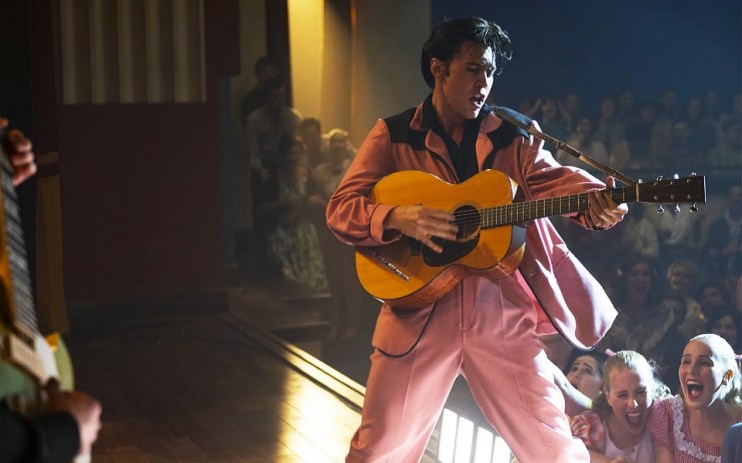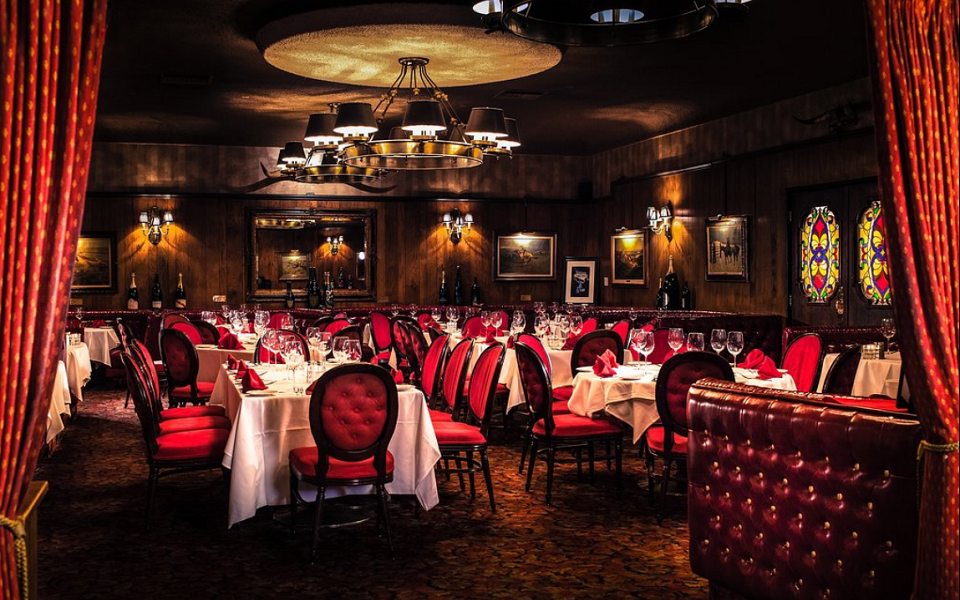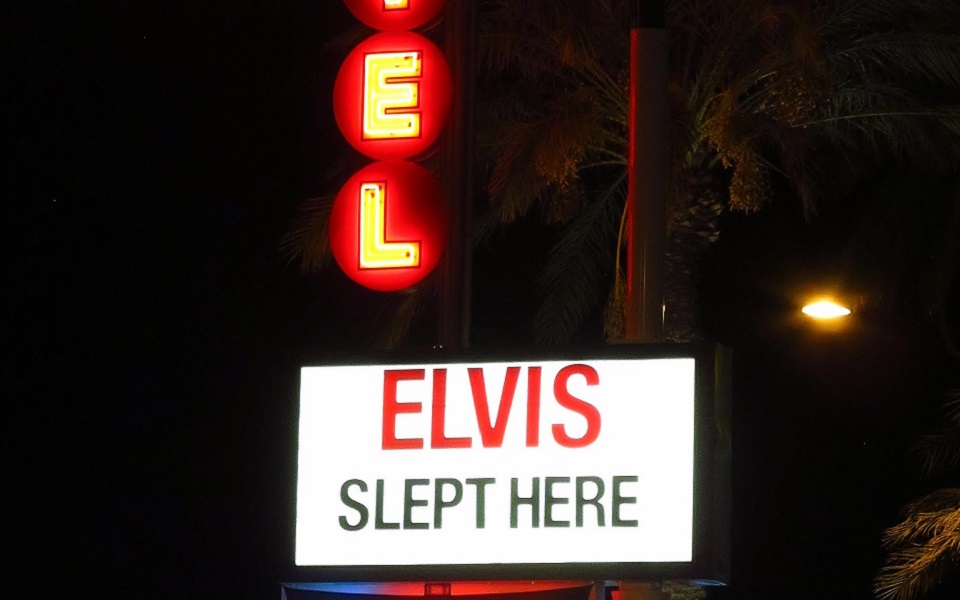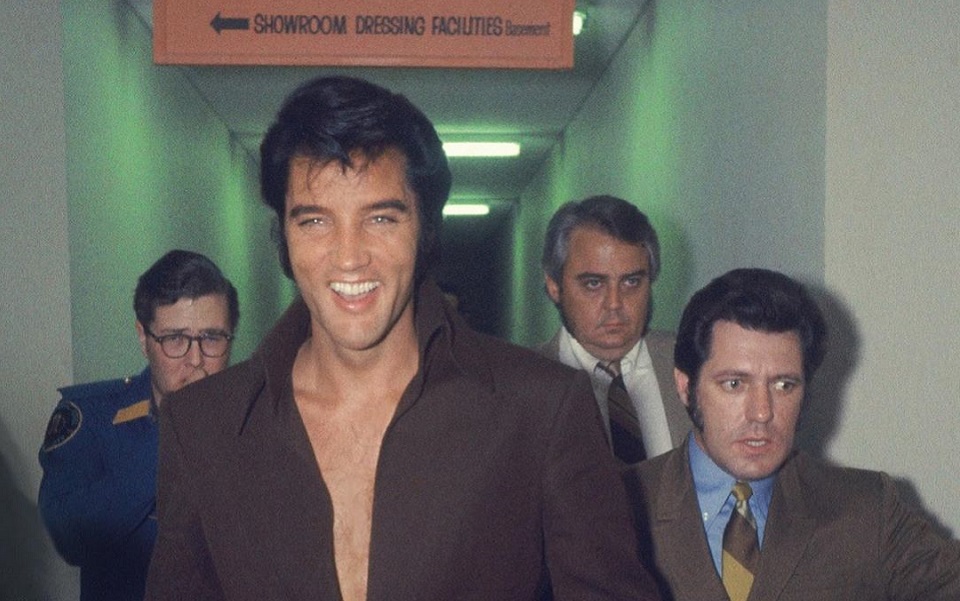The new Elvis film inspired me to go searching for Elvis in Las Vegas

Austin Butler’s Oscar-nominated performance as Elvis inspired Adam Bloodworth to touch down in Las Vegas, in pursuit of the King’s legacy
Baz Lurhmann’s Elvis biopic has the white bodysuits and the polished quiff, of course. But for those of us under 40, it’s also a vital lesson revealing the cultural significance of Elvis to the generations of us who had reduced him to cliché. Elvis’ philanthropy and passion for civil rights, for instance, are unpacked. He had been jumping racial segregation barriers in the 1950s long before being inclusive was cool, and was refusing to stop being photographed with Black artists like B.B. King despite being condemned for it by the white community.
Until Austin Butler came along, it felt like these details about Elvis’ legacy were finally starting to fade. But the 31-year-old Californian actor has brought it right back into the public consciousness. He won the BAFTA and the Golden Globe for Best Actor for his portrayal of the King, and he’s tipped to win the Oscar next week. Rightly so: Elvis is a pioneering film, preserving the singer’s legacy for future generations.
I wanted to understand more, so I went on the trail of Elvis in the place with which his performances – and his downfall – had become synonymous. Las Vegas. The city that arguably killed Elvis. It’s widely thought his manager The Colonel kept him contracted into performing here year after year due to the financial difficulties Elvis ran into, partially over his addiction to drugs.

It was at the Las Vegas Hilton, now the Westgate Las Vegas Resort & Casino, where he would perform 636 sold-out performances from 1969 to 1976. One of the final scenes in the Luhrmann movie – and one of the most spectacular – juxtaposes images of Elvis during one of his last performances in Vegas with Butler’s version of the performance. Elvis is sweating, overweight and unable to hold his own microphone, but his baritone is pitch perfect.
Touching down in Vegas, it turns out everyone and their mum has a story about Elvis. I start at the Golden Steer, a steakhouse on a nondescript thoroughfare leading out of town, the only giveaway of the restaurant’s big deal status is the long queue that forms every day an hour before opening. Inside, I notice one shiny black leather booth has a small silver plaque reading “Elvis Presley’s booth.” It’s four o’clock on a weekday and outside the sun blares unforgivingly, but in here there’s the dark intensity of a nightclub and barely a free table.
Later I roll my window down on South Las Vegas Boulevard to see the Normandie Motel’s sign which reads “Elvis slept here.” Vickie’s Diner, not far from the former Las Vegas Hilton, now called the Westgate Hotel, boasts that the King popped in for burgers. I did too and the owner speaks fondly of the before times. Bequiffed impersonators marry hundreds of couples at Elvis chapels each week, even if some look more like fraudsters attempting to commit Elvis identity crime than the King himself.

But mostly, Las Vegas has moved on. Gone are the Elvis impersonator shows that used to be ten-a-penny on the Strip. One sign of the times is my twenty-something taxi driver, who calls Celine Dion the “dinosaur” of the Strip. What on Earth does that make Elvis? These days, Someone Like You has a higher cache in Vegas than Suspicious Minds. The most popular impersonator show in town, Legends of Las Vegas, features Adele and Lady Gaga but there’s no mention of the King.
There is one place that remains key to Elvis’ legacy: the Westgate Las Vegas Resort & Casino, where the singer lived and performed for the final years of his life. The Westgate is a vital historical beacon amid a city of constant, ferocious change. Currently, the family hotels of the 1990s, including The Mirage, are being ripped out and replaced with more conventional luxury properties such as the newly built Aria and Resorts World, but amid this, the Westgate remains.
There’s times I’ll be sitting in my suite, looking out the window and go, ‘God this is so surreal.’ I was here when it was happening. I lived the history
David Stanley, Elvis’ step-brother, speaking to City A.M.
It’s fabulously camp. The 68,000 crystals in the chandeliers in the lobby are original from when the hotel opened in 1969. There’s a photograph on the wall of the James Bond movie Diamonds are Forever, which was shot here. At Sid’s Cafe on the left of the lobby, the decor and waiters have been the same for over 40 years; there’s also a carbonara worth writing home about.

“Pull your best Elvis pose!” says Gordy Prouty, the Westgate Las Vegas’ vice president of public relations. He’s snapping pics of me on my phone while I try – badly – to emulate the dance moves that earned Elvis the nickname ‘Elvis the Pelvis’. We’re standing in the middle of the Westgate International Theatre stage, where Elvis performed two shows a day before retiring to his 30th floor penthouse suite. I get the sense Gordy has done this before: he knows almost to the metre where I should stand to feel properly in the shadow of the late legend. Very little in the auditorium has changed, except the conch shell seating, which has been ripped out and replaced with conventional rows.
Within the context of Las Vegas’ constant renewal, it’s miraculous this stage has survived. Barry Manilow performed here the day before I visit, but really, everything’s still set up for Elvis. Exiting stage left, a sign earmarks where the King would hold his hand to the wall and pray before every performance. Five metres away is the lift Elvis used to get from the downstairs dressing room. Downstairs, ten metres from the bottom of the lift in the main dressing room, the bartop Elvis designed and his large mirror remain. The simple cream shower room and toilet facilities are the same as they always have been, so Manilow poops where Elvis did. It’s haunting but thrilling to pep my own collar and stare into the mirror hoping – praying, like Elvis did – for my own sonic inspiration. Nearby, there’s a water fountain Gordy tells me “fans go crazy for,” pre sumably because it’s where Elvis drank. I’m struck by how little these practical objects change over time.

The Westgate’s lobby has an old school type of ostentatious charm. A statue of Elvis gyrating with mic in hand is the first thing you notice, and there are gorgeous black and white photos of the King smiling in his heyday lining the walls. There’s also a little exhibition of some of the other stars who’ve played here. Occasionally, Elvis would stroll through the casino after shows, but he wouldn’t go much further. It turns out we should have suspicious minds about the image of Elvis gallivanting around restaurants and staying in nearby motels after shows.
People say a lot of things about Elvis that are just not true. ‘Elvis hung out at the Golden Steer’ – no he didn’t – he might have
David Stanley on Elvis’ legacy
“I was with Elvis for 17 years, every show, and we never went to the Golden Steer,” says David Stanley, Elvis’ stepbrother. Stanley works at the Westgate now but in the 1970s he was Elvis’ assistant and lived with him at the hotel. “Everybody wants him to be this…” Stanley gestures, suggesting some larger-than-life character. “He just didn’t do that.”
Stanley has begun meeting and greeting fans in the lobby of the Las Vegas hotel recently, after another employee at the hotel found out about his historical connection. He signs autographs and poses for photos a few days a week. Stanley’s written six books about his step-brother and loves telling stories about his days with Elvis. He now lives on the 28th floor of the hotel, two floors below the penthouse suite where he spent years working with Elvis.
“There’s times I’ll be sitting in my suite, looking out the window and go, ‘God this is so surreal.’ I was here when it was happening. I lived the history. They look at me at the Westgate as a historical figure who can check what’s real and what’s not. There’s people say a lot of things about Elvis that are just not true. ‘Elvis hung out at the Golden Steer’ – no he didn’t – he might have went there once… He had food brought up to the room, we had a great steakhouse here back then, and a great Italian restaurant. He wasn’t jumping in the limo and cruising the strip, that just wasn’t Elvis, that’s not who he was.”
Instead they’d stay in the expansive suite, which has been remodelled now but used to have a rooftop area for sunbathing and karate. “We’d train an hour or two, on Sundays we’d watch football, we just lived here,” says Stanley. “We’d go outside on the roof to get sun and lay on the roof of the hotel. He was very big brotherish, and talked a lot about faith, that was his biggest advice, embrace your faith.”
Up on the 30th floor, there are views of the scorched mountains in the distance, and the roads stretching towards Arizona, exactly as Elvis would have viewed them. The Verona Sky Villa suite, at 15,000 square feet, is where Elvis’ suite used to be and has an ostentatious European style, with gold embossed detailing everywhere and enough rooms to get properly lost in. It might be the most opulent place I’ve ever been. Gordy describes the feel in this suite as “close to timeless,” which feels like a fitting tribute to the King.
Visit Las Vegas yourself
Rooms at the Westgate Las Vegas Resort & Casino start from £57 per night. The Verona Sky Villa, which occupies the space where Elvis’ Penthouse was, is costed on request. DOS@wgresorts.com for information. Barry Manilow has more concerts in Elvis’ old theatre throughout the year. VIP Elvis backstage and dressing room tours are available at the hotel available for small groups, use email above.
Find more travel inspiration at City A.M. Travel
